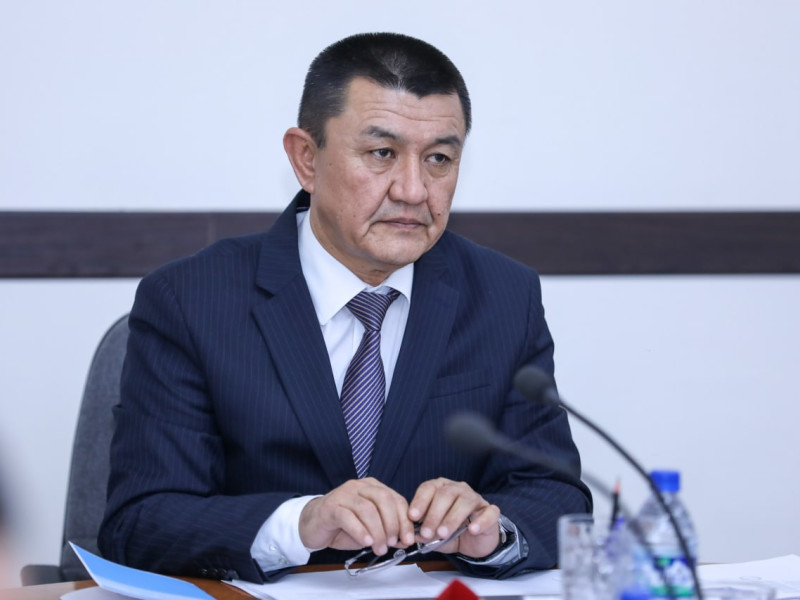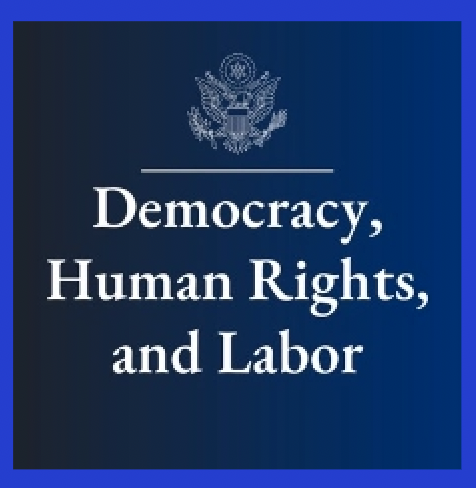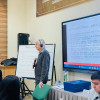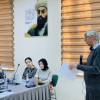
An article on Judicial system in Uzbekistan: reforms and outcomes
By Kholmumin Yodgorov, Chairman of the Supreme Judicial, Council of the Republic of Uzbekistan
Undoubtedly, at the center of the positive changes taking place in New Uzbekistan are the reforms being implemented in the judicial system. Over the past six to seven years, revolutionary changes took place in the system. As a result, the institution of justice was improved, in particular, open and transparent procedures for the formation of the judiciary, selection and appointment to this position were introduced, and the legal basis for ensuring the true independence of judges was improved.
The Supreme Judicial Council of the Republic of Uzbekistan was established in accordance with the Decree of the President of the Republic of Uzbekistan Sh.M.Mirziyoyev (February 21, 2017. PF-4966) in order to ensure compliance with the constitutional principle of judicial independence on the basis of international standards, and to form a truly independent judiciary. According to the new edition of the Constitution of the Republic of Uzbekistan (April 30, 2023), the Supreme Judicial Council is granted the status of a body that ensures the formation of the judiciary and compliance with the constitutional principle of independence of the judiciary, which is a constitutional guarantee of the independent and effective implementation of the tasks assigned to it.
Also, the Law “On the Supreme Judicial Council of the Republic of Uzbekistan” was adopted (April 6, 2017), which reflected important norms. In particular, it was determined that the Council shall act on the basis of the principles of legality, independence, collegiality, impartiality, equality and openness.
It is worth noting that this Law also changed the procedure and forms of appointment to judicial positions. In order to ensure the independence of the judiciary from other branches of government, the administration of impartial and fair justice by judges, the powers to appoint and dismiss judges of regional, interdistrict, district (city) courts have been completely transferred to the Supreme Judicial Council, and the procedure for agreement with the President of the Republic of Uzbekistan has been canceled. In addition, appropriate amendments have been made to the legislation that powers of Supreme Judicial Council to request the necessary information, documents and other materials related to the activities of the Council from state bodies and other organizations, as well as from officials and citizens, to extend the maximum age limit of a judge, to conduct service inspections against the members of the Council, who perform their activities on a permanent basis and to consider the issues of bringing them to disciplinary responsibility have been established.
The selection and appointment of judges was introduced in the form of an open competition and advanced information technologies were introduced into this process. As a result, the human factor was limited, and it became possible to conduct appointments openly and transparently.
It is known that the democratic formation of the composition of the Supreme Judicial Councilguarantees not only the independent functioning of its members, but also the independence of the entire judiciary.
In accordance with Article 5 of the Law “On the Supreme Judicial Council of the Republic of Uzbekistan”, the Council is formed by a Chairman, Deputy Chairman, secretary and eleven members approved from among the judges, as well as seven public members approved from among representatives of civil society institutions and highly qualified specialists in the field of law – a total of twenty-one people.
The fact that the majority of members of the Supreme Judicial Council are made up of judges fully complies with international requirements and the principle of judicial self-governance. In particular, such a recommendation on the composition of the Council is reflected in paragraph 20 of the expert opinion of the OSCE Office for Democratic Institutions and Human Rights and the European Commission for Democracy through Law (the Venice Commission), as well as in other international standards.
The old edition of the Constitution of the Republic of Uzbekistan did not specify the norms regarding the formation of the structure of the Supreme Judicial Council. This issue was regulated only by the Law “On the Supreme Judicial Council of the Republic of Uzbekistan”, according to which it was established that the Chairman of the Council is appointed by the Senate of the Oliy Majlis of the Republic of Uzbekistan on the proposal of the President of the Republic of Uzbekistan, and the Deputy Chairman of the Council is appointed by the President of the Republic of Uzbekistan.
Now this procedure has been changed at the level of the Constitution, according to which the Chairman of the Supreme Judicial Council of the Republic of Uzbekistan and the Deputy Chairman shall be elected on the proposal of the President of the Republic of Uzbekistan by the Senate of the Oliy Majlis of the Republic of Uzbekistan for a five-year term. In addition, the terms of office of the Chairman and Deputy Chairman of the Council have also been clarified, and it has been established that the same person cannot be elected to this position for more than two consecutive terms.
Decrees of the President of the country “On additional measures to further improve the activities of the courts and increase the efficiency of justice” (dated July 24, 2020, PF-6034) and “On measures to ensure the true independence of judges and increase the effectiveness of preventing corruption in the judicial system” (dated December 7, 2020, PF-6127) brought the reforms of the judicial system to a new level. Based on these legal documents, a number of guarantees were created to further strengthen the status of judges, guarantee their independence, and strengthen their inviolability. Based on this, the Chairman of the Supreme Judicial Council of the Republic of Uzbekistan was given the authority to submit an application to the Prosecutor General’s Office on facts of violation of the immunity of judges and interference in their activities in the administration of justice. The procedure for reviewing the application by the prosecutor’s office within one month, informing the Supreme Judicial Council of the Republic of Uzbekistan that a criminal case has been instituted or rejected based on the specified facts has also been strengthened by law.
In order to strengthen the immunity of judges, enshrining the norm in the new edition of the Law “On Courts” was also an important step in reliable protection of judges’ immunity, according to which if a judge is suspected of committing a crime, it is necessary to report this to the Supreme Judicial Council of the Republic of Uzbekistan (with attached copies of documents that are the basis for the detention of the judge) no later than three hours from the moment the judge was detained, calling a judge to law enforcement agencies for questioning as a witness or suspect is allowed only with the consent of the relevant qualification board of judges.
In addition, the Decree No. PQ-4096 of the President of the Republic of Uzbekistan dated January 6, 2019 “On measures to radically improve the system of training candidates for judicial positions, retraining judges and judicial personnel, improving their qualifications” was an important step in strengthening the independence of the judiciary in our country, forming a corps of professional judges, and increasing the level of citizens’ access to justice.
According to this Decree, for the first time in our country, a state educational and scientific-research institution responsible for the training of candidates for judicial positions, the retraining of judges and judicial personnel, and the improvement of their qualifications – the Supreme School of Judges under the Supreme Judicial Council of the Republic of Uzbekistan was established.
One of the main tasks of the Supreme School of Judges is the preparation of candidates for judicial positions, the retraining of judges for leadership positions, and the establishment of a unified system of training of judges and judicial personnel. In this process, introduction of an interactive teaching methods into the educational process that develop the skills of justified decision-making skills using innovative pedagogical and information and communication technologies, the need to develop theoretical and practical knowledge of students in jurisprudence, professional ethics, psychology, workplace communication, time management, negotiation methods, information technology, interpretation and application of legal norms have been determined.
The Supreme Judicial Council has been accepted as a member of the International Organization for Judicial Training (IOJT).
In addition, as a result of the Decree of the President of the Republic of Uzbekistan dated December 7, 2020 “On measures to ensure the true independence of judges and increase the effectiveness of preventing corruption in the judicial system” (December 7, 2020, PF-6127), and amendments and additions to the legislation based on this Decree, the formation of the judiciary, the effective introduction of openness and transparency into the system, especially an in-depth study and analysis of the causes and conditions causing corruption cases, and, finally, work to increase the confidence of citizens and business entities in the judiciary has reached a new level. At the same time, legal mechanisms were created to ensure effective protection of the professional activities of judges in the administration of justice from external influences of any kind. Modern information technologies are consistently being introduced into the processes of selection, preparation and appointment of candidates for the position of judge.
Based on the principle “There is no justice where there is no spirituality,” on the initiative of the Council, an educational book “Spirituality, Ethics and Responsibility of a Judge” was published and distributed free of charge to all judges. High human and moral qualities of a judge are one of the important factors in making fair decisions. The book describes in detail the criteria of a judge’s ethics and responsibility to society.
It has become a tradition to award the “Court Veteran” badge to court veterans who have worked effectively in the system for many years and left a worthy name for themselves, as well as to publish a number of books about their life and activities in the “Ibrat maktabi” series.
One of the real innovations in the system is the introduction of a national electronic rating program for open and transparent assessment of the performance of judges. In this program, the judge is evaluated based on the criteria of professionalism, competence, discipline, and responsibility in an open, transparent manner and without the human factor. Judges with high rating scores have been awarded with the “Outstanding Judge” award introduced by the above-mentioned Decree. In the past three years, 50 judges were found worthy of this award.
Another innovation: modern information technologies have been widely introduced into the activities of the Supreme Judicial Council. In particular, a program for automated selection of questions asked during interviews with candidates for judicial positions and judges using an information system has been developed and is being put into practice.
Questions asked during the interview process to select candidates for the first appointment to judicial positions, candidates for a new term of office or other judicial positions are automatically selected by the candidate using the information system.
The question paper chosen by the candidate and the questions in it can be directly monitored online by other candidates and members of the public. The electronic question program is located at https://bilet.sjco.uz/.
For the first time, online coverage of the examination process for selecting candidates for the judicial positions has been launched through the Internet (website).
An electronic program has been developed and fully launched that helps assess the suitability of candidates for the judicial positions and judges based on their psychological profile. By decision of the Supreme Judicial Council, the Regulation “On the system of psychological tests that help assess the professional suitability of candidates for the judicial positions and judges” was approved.
With the help of psychological tests and interviews, a professional psychologist gives recommendations about the worldview of judges, resistance to various situations in court, skills in assessing the situation, and even a tendency towards alcoholism and corruption. These findings are becoming increasingly important in the appointment process.
For information: in 2022-2023, 138 judicial candidates and 901 judges passed a psychological test, based on the results, psychological trainings were conducted with 258 judges and psychological interviews with 40 judges.
An effective system aimed at prevention and early detection of corruption cases among judges and court officials has been established, and any detected corrupt action is being regarded as an unacceptable situation. Based on this, the annual program aimed at preventing cases of corruption and forming an uncompromising attitude is being approved and implemented.
It is no coincidence that information on the approval of the National Strategy of the Republic of Uzbekistan on Human Rights was published in six UN languages and distributed as an official document of the 74th session of the General Assembly. The National Strategy was developed on the basis of the Vienna Declaration and Programme of Action, which took into account the recommendations of the Office of the UN High Commissioner for Human Rights, the OSCE Office for Democratic Institutions and Human Rights, as well as international experts.
The National Strategy of the Republic of Uzbekistan on Human Rights provides, among other things, the following measures:
– creation of an effective mechanism that ensures the wide application of universally recognized principles and norms of international law and international treaties to which the Republic of Uzbekistan is a party in the activities of courts and law enforcement agencies:
– by further improving the institution of “habeas corpus”, forming a legal basis for the activities of the bodies of the judicial community in order to radically increase the role of the judiciary in the field of ensuring the independence and impartiality of the courts and human rights, freedoms and legal interests;
– implementing the principles of equality and debate in court proceedings, turning the advocacy into an independent and reliable institution that protects rights, increasing the quality of professional legal assistance and the prestige of the legal profession, improving the system of training lawyers specializing in the field of human rights;
– issues such as aligning the activities of prosecutor’s offices with the requirements of international standards, ensuring the transparency and accountability of prosecutor’s offices to society, and strengthening the role of collegial bodies in the management system of the prosecutor’s office are included.
One of the important realities in the system is the creation of the Club of Judges of Uzbekistan under the Supreme Judicial Council as part of the implementation of the Decree of the President of the country “On measures to ensure the true independence of judges and increase the effectiveness of preventing corruption in the judicial system” (07.12.2020). The Club of Judges of Uzbekistan is a public organization empowered to provide recommendations on the correct application of substantive and procedural law, as well as provide clarification on requests for the application of rules of conduct for judges in specific situations.
To date, 457,531 messages, opinions and comments on 13,104 topics have been posted by judges on the Club of Judges’ online forum.
The Club was established in order to contribute to social justice through the formation of unified judicial practice, improving the quality of court decisions and the accountability of judges, and its past short activity has shown the need for such a structure in practice.
Furthermore, the Supreme Judicial Council of the Republic of Uzbekistan became the winner of the “Gender Equality Activist – 2022” national competition in the nomination “The most active republican level state body (organization) in ensuring gender equality” held by the Senate of the Oliy Majlis, the Republican Commission for Increasing the Role of Women in Society, Gender Equality and Family Issues, and the Committee on Family and Women.
In addition, for the first time in history, three Uzbek women judges took part in the XVI Conference of the International Association of Women Judges, held in Morocco, and were accepted as members of this international organization.
According to the target indicators of the strategy for achieving gender equality in the Republic of Uzbekistan, it is planned to increase the share of women among judges to 20% in 2025 and 30% in 2030. In particular, this requires further improvement of the efficiency of training, selection and appointment of women to judicial positions.
The high-quality implementation of these tasks will increase the participation of female judges in ensuring the rule of law in society, especially in the fight against human trafficking, violence against women, and ensuring legitimacy in this regard.
 Disclaimer: The views expressed in this publication are those of the author(s) and do not necessarily represent the opinions of Regional Dialogue.
Disclaimer: The views expressed in this publication are those of the author(s) and do not necessarily represent the opinions of Regional Dialogue.










